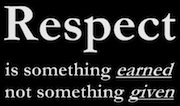
Easy!
1. Proactively ‘fess up to material mistakes, significant errors, and missed targets.
2. Take full responsibility for solving challenges. Fully live up to this commitment.
3. Give a deadline for completion without being asked. If uncertain, give an estimate along with a timeframe to firm up, along with interim reporting dates.
4. State your lessons learned, offer to share with others if appropriate. The least expensive mistakes are the ones where the entire organization learns.
5. Report back when full resolved. Don’t make your boss track you down or follow up on his or her own.
Only the confident have the courage to report their own fumbles and only the competent can recover a situation after a fumble. These skills are beloved by supervisors, as the combination is rare and valued. A person who self-reports problems earns trust. All bosses know that problems happen, that while we strive for perfection, errors do occur and some targets don’t always get hit dead on. What bosses want to know is that problems are being solved with a sense of urgency, that errors are being addressed, systems and training are tweaked to minimize them, and that renewed efforts are being made to achieve organizational goals.
No good boss wears rose-colored glasses or knowingly rewards those who hide mistakes; no competent organization shoots the messenger. If you see that happening as a matter of policy (vs. an isolated occurrence), sing out loud and long. If your sincere efforts are not appreciated and acted upon, find another job; you’re in a dysfunctional organization.
Closing quotes:
“An error doesn’t become a mistake until you refuse to correct it.” — Orlando A. Battista; 1917–1995, Canadian-American chemist, author of 16 books
“Any man is liable to err, only a fool persists in error.” — Marcus Tullius Cicero
“Error is discipline through which we advance.” — William Ellery Channing; 1780–1842, leading Unitarian theologian; known for his articulate and impassioned sermons and public speeches and as a prominent thinker in the liberal theology of his day
“Give me a fruitful error anytime, full of seeds, bursting with its own corrections.” — Vilfredo Pareto; 1848–1923, Italian engineer, sociologist, economist, political scientist, and philosopher; author of the Pareto Principle


0 Comments